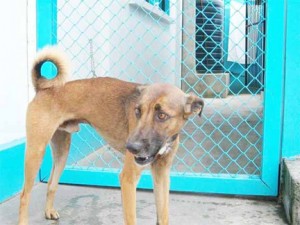Ear ailments
(Continued)
Maladies of the ear flap (Pinna)
Biting flies
The ear flap has an assortment of blood vessels which, when damaged, tend to bleed uncontrollably. With every scratch, any blood clot which was formed is then removed, and the bleeding begins all over again. The tips of the ear have crusted blood from which might ooze fresh blood.

One of the main causes of blood vessel damage is the biting fly. I think in Guyana, we call these big flies with massive jaws ‘cow flies’ or ‘horse flies.’ The scientists call them Tabanids – after the family to which they belong. They seem to have a preference for biting the tips of dogs’ ears.
These are serious pests, especially the female. The male doesn’t bite the ear since it lives off vegetable juice and flowers instead of blood. The female, on the other hand, is equipped with bladelike jaws which inflict painful wounds that result in a great flow of blood, which she laps up. You can imagine that the flowing blood will attract other flies and there is a feeding frenzy – to the discomfort and detriment of the dog. On the wounds caused by the horse flies, screw-worm flies lay their eggs; and you know what those maggots do.
Try as I did to find out the life cycle of the horse fly here in Guyana, it seems that no one and no book can tell me definitely about the development of this fly from egg to adult. Some smart books speak of one to two years. The knowledge of the life cycle is important, because we could then prepare the animals’ ears and use repellents for the seasonal onslaught. Most Tabanids have only a single brood each year – quite unlike most of the flies we know.
In passing I should mention that horse flies can actually mechanically transmit diseases in livestock, and some of them can serve as an intermediate host for some disease agents. However, I have not come across any literature that documents such disease transmission in dogs.
Treatment
If we get flies to stop biting the ear, then we have made the first step towards ensuring recovery of the animal. However, it is not a very simple proposition. Horse flies are intermittent feeders (they come and they go quickly from the dog’s ear), so they are never exposed long enough to be killed by any insecticide. One can use commercial fly repellents to protect the ear tip from fly bite. The active ingredient in any of the repellents breaks down quickly and consequently, the (spray or cream/ointment) must be applied frequently in order to be optimally effective.
I notice lots of pet owners use the anti-maggot spray (‘Blue Spray’). The chemical compound contained therein is pretty toxic (after all, it’s to kill scores of maggots) and can damage the ear tissue, and if absorbed in high enough quantities, can damage other organ tissues as well.
If the ear is bleeding incessantly, then you may need to see your veterinarian for him/her to tie off the burst blood vessel(s).
One final comment: Please do not panic when you find the kennel or the bottom house sprayed with blood from a bleeding ear. The situation gives the impression that the dog has lost a lot more blood than he actually has. Within minutes, your vet can stop the bleeding.
Enjoy your week!
Please implement disease preventative measures (vaccinations, routine dewormings, monthly anti-heartworm medication, etc) and adopt-a-pet from the GSPCA’s Animal Clinic and Shelter at Robb Street and Orange Walk, if you have the wherewithal to care well for the animals. Do not stray your unwanted pets, take them to the GSPCA’s Clinic and Shelter instead. If you see anyone being cruel to an animal, or if you need any technical information, please get in touch with the Clinic and Shelter by calling 226-4237.








